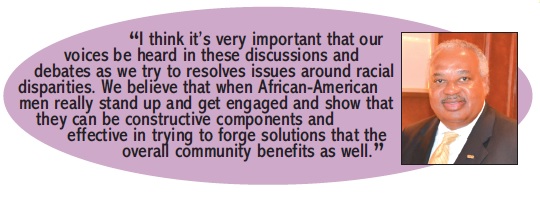Interview with 100 Black men of America Chairman Curley Dossman
“Four For The Future”
by A. David Dahmer
The 100 Black Men of Madison got a special treat at their breakfast on Aug. 12 when Curley Dossman, Jr., the chairman of the board of directors for the 100 Black Men of America, Inc., dropped in to break bread with the local chapter and talk about 100 Black Men initiatives.
“This is my first time to Madison and I’m really enjoying it,” Dossman told The Madison Times in an interview at the Olive Alcove of the Hilton Monona Terrace Hotel in downtown Madison. “My wife has family in Milwaukee and Racine. I’m very familiar with the state, but this is my first time to Madison. It reminds me of a number of capital cities that I have visited. I’m really enjoying meeting the 100 Black Men of Madison members, too.”
Dossman was the keynote speaker at the 100 Black Men of Madison’s 6th annual Backpack for Success Appreciation Dinner held later that night at the CUNA Mutual Conference Center. Over the past 18 years, The 100 Black Men of Madison have provided over 25,000 backpacks filled with school supplies (at no charge) to area disadvantaged students.
“As I make my rounds around the country, I’ve made it a point to try and see as many chapters as I can in a given year,” Dossman says. “This is where the rubber meets the road; where the work gets done and where the direct interfacing with the young people occurs. I always feel rejuvenated to get out to local chapters and talk with the men who so generously give up their time, talents, and resources in their local community.”
The 100 Black Men of America, Inc. are a volunteer organization of approximately 10,000 members and partners who are transforming the lives of youth and improving communities through a unified mission and a network that encompasses 110 local chapters and over 50 Collegiate 100® chapters on college campuses.
Dossman has just completed his first two-year term as chairman and has been re-elected for another three years. “I’m really enjoying it because there’s nothing like being able to see young people who are really motivated to achieve their dreams … to actually enhance their opportunity for a more forthright and giving lifestyle for them going forward,” he says. “I really enjoy getting out to see members who are really trying to make a difference because we know the dire needs of these communities and we also understand the statistics that we see. We’re trying to do everything we can to change the trajectory and the lives of these young people who get engaged with us.
“My visit to Madison was very timely and apropos because we just had a slight change in our governing structure that the membership approved last December and at our national conference this past June in Florida,” Dossman adds.
There they elected a new set of officers under a new governing structure. “So, this is an opportunity for me to actually get out and meet with the local chapters [to] further explain the rationale behind the governance change and what we believe will be the benefits and impact for the organization as we go forward,” he says.
Nationally, Dossman says, the 100 Black Men operate on the platform of “Four For The Future” — education, mentoring, health and wellness, and economic empowerment. “We’ve been working on a number of new initiatives. I’m here to try and support the local chapters as they try to expand their impact on the health and wellness area,” he says.
Dossman is excited to lend his expertise to the 100 Black Men of Madison as they prepare for their 2nd Annual Prostate Cancer Awareness Walk Sept. 13 in downtown Madison to raise awareness about a disease that is the second-leading cause of cancer deaths among men in the United States and affects African-American men more than any other nationality.
“There are some things that the men in Madison are looking at around prostate cancer. They’ve had the prostate cancer walk. [Prostate cancer] has a unique and overbearing impact on African-American males,” Dossman says. There are some additional things that they would like to do to broaden that effort in their work. Hopefully, I can help support them as they try to drive to a broader platform around that issue.”
Even though this is his first visit, Dossman is well aware of the tremendous racial disparities in the city of Madison and in Dane County and he feels that agencies like the 100 Black Men can play a big part in lessening those numbers.
“I think it’s very important that our voices be heard in these discussions and debates as we try to resolves issues around racial disparities,” Dossman says. “We believe that when African-American men really stand up and get engaged and show that they can be constructive components and effective in trying to forge solutions that the overall community benefits as well.
“Particularly for men who have been through the trenches themselves and know what hard work means and how to make sacrifices to accomplish goals,” he adds. “It’s important for them to be able to stand before kids and say, ‘I’m not much different from you. I’ve come from similar circumstances and have been successful.’ We do know that when an adult shows a unique and specific interest in a young child that they can help change the life trajectory for that child.”

